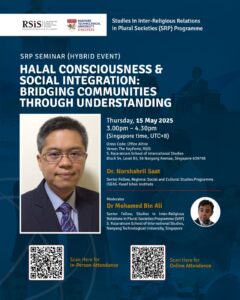Abstract
This seminar will offer a critical exploration of the various dimensions of halal consciousness, focusing particularly on how Muslims in Singapore and the wider region understand, interpret, and practice halal observance. While the concept of halal is rooted in clear textual sources, its application today intersects with consumerism, identity politics, and shifting patterns of religious authority. In addition to mapping key themes—such as the meanings of halal, its association with social conservatism, and its influence on communal and public life—the seminar will consider emerging tensions between halal observance and interfaith engagement. It will also explore how Islamic traditions can support both rigorous halal adherence and social cohesion in plural societies.
About the Speaker
 Norshahril Saat is a Senior Fellow at the ISEAS–Yusof Ishak Institute, where he coordinates the Regional Social and Cultural Studies Programme. He earned his PhD in International, Political and Strategic Studies from the Australian National University in 2015, following a BA (Hons) in Political Science and an MA in Malay Studies from the National University of Singapore. His research focuses on the politics of Malaysia, Indonesia, and Singapore, with a particular interest in political Islam and Islamic authority in Southeast Asia. Dr. Saat has authored several notable works, including The State, Ulama, and Islam in Malaysia and Indonesia (Amsterdam University Press, 2018) and Tradition and Islamic Learning: Singapore Students in the Al-Azhar University (ISEAS, 2018). He also serves as Chairman of the Malay Heritage Foundation and contributes to various national advisory boards, such as the National Library Board and the Lee Kuan Yew Fund for Bilingualism.
Norshahril Saat is a Senior Fellow at the ISEAS–Yusof Ishak Institute, where he coordinates the Regional Social and Cultural Studies Programme. He earned his PhD in International, Political and Strategic Studies from the Australian National University in 2015, following a BA (Hons) in Political Science and an MA in Malay Studies from the National University of Singapore. His research focuses on the politics of Malaysia, Indonesia, and Singapore, with a particular interest in political Islam and Islamic authority in Southeast Asia. Dr. Saat has authored several notable works, including The State, Ulama, and Islam in Malaysia and Indonesia (Amsterdam University Press, 2018) and Tradition and Islamic Learning: Singapore Students in the Al-Azhar University (ISEAS, 2018). He also serves as Chairman of the Malay Heritage Foundation and contributes to various national advisory boards, such as the National Library Board and the Lee Kuan Yew Fund for Bilingualism.



 Add to Google calendar
Add to Google calendar
 Add to Outlook calendar
Add to Outlook calendar

